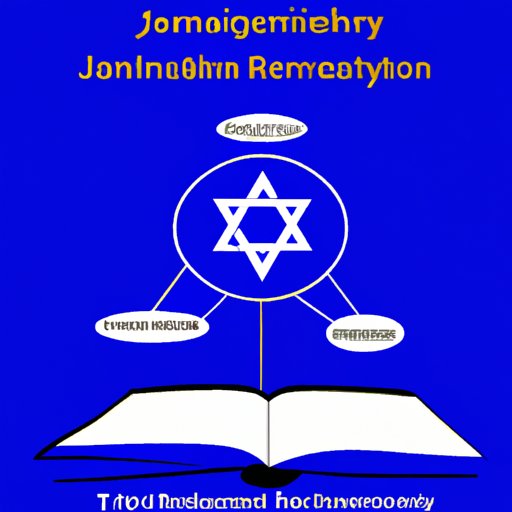Introduction
Being a Jew is more than just following a religion; it is being part of a vibrant culture and heritage that has been around for thousands of years. Jews have a rich history, culture, and set of beliefs and practices that have been passed down through generations. To be a Jew means to embrace and celebrate these traditions and to take part in the larger Jewish community.
To understand what it means to be a Jew, it is important to first define Judaism. Judaism is an Abrahamic religion based on the teachings of Moses and the Torah (the five books of Moses). It is the oldest major religion still practiced today, and it is one of the world’s most widely-practiced religions. The core beliefs of Judaism are belief in one God (monotheism), the importance of ethical behavior, and the observance of rituals and ceremonies.

Understand the Foundations of Jewish Beliefs and Practices
The first step to becoming a Jew is to learn about the foundations of Jewish beliefs and practices. This includes exploring the five books of Moses (the Torah) as well as studying Jewish theology and philosophy. Additionally, it is important to understand the various Jewish holidays and their significance. By learning about these aspects of Judaism, you will gain a better understanding of the religion and its customs.
Learn About the Five Books of Moses
The five books of Moses (also known as the Torah) are the foundation of Jewish beliefs and practices. They include the books of Genesis, Exodus, Leviticus, Numbers, and Deuteronomy. These books contain stories and teachings that form the basis of Jewish religious law and practice. By reading and studying these books, you will gain an understanding of the beliefs and values held by Jews.
Explore Jewish Theology and Philosophy
In addition to the five books of Moses, there are other sources of Jewish theology and philosophy. These include the Talmud, Midrash, and Kabbalah. The Talmud and Midrash are collections of commentaries on the Torah, while the Kabbalah is a mystical tradition focused on understanding the deeper meanings of the Torah. By exploring these sources, you can gain a deeper understanding of the beliefs and practices of Judaism.
Study the Jewish Holidays
Jewish holidays are important parts of the Jewish culture and religious practice. The most important holidays are Passover, Shavuot, Rosh Hashanah, Yom Kippur, Sukkot, Hanukkah, and Purim. Each holiday has its own special rituals and traditions, such as prayer services, special meals, and gift-giving. By learning about these holidays, you can deepen your knowledge of Judaism and participate in the celebration of these important dates.
Participate in Jewish Rituals and Celebrations
Once you have a better understanding of the foundations of Jewish beliefs and practices, the next step is to take part in Jewish rituals and celebrations. This includes attending synagogue services, observing the Sabbath, and celebrating Jewish festivals. By participating in these activities, you can get a firsthand experience of what it means to be a Jew.
Attend Synagogue Services
Synagogue services are held on the Sabbath (Saturday) and on holidays. During these services, prayers, songs, and readings from the Torah are recited. Attending synagogue services is a great way to connect with the Jewish community and to learn more about Jewish beliefs and practices. For those who are new to Judaism, many synagogues offer classes and workshops to help introduce newcomers to the faith.
Observe the Sabbath
The Sabbath is a day of rest and reflection for Jews. On this day, Jews refrain from work and instead focus on prayer, study, and spending time with family. It is considered a sacred time, and many Jews observe the Sabbath by going to synagogue, lighting candles, and saying special prayers. By observing the Sabbath, you can join in the spiritual practice of the Jewish people.
Celebrate Jewish Festivals
Jewish festivals are an important part of the Jewish calendar. Most festivals involve special meals, prayer services, and other rituals. Some of the most well-known festivals include Passover, Hanukkah, and Purim. By taking part in these celebrations, you can further immerse yourself in Jewish culture and traditions.
Connect with Jewish Community Organizations
In addition to participating in Jewish rituals and celebrations, it is also important to connect with Jewish community organizations. These organizations provide opportunities to meet other Jews, learn more about Judaism, and get involved in local Jewish life. There are many different types of organizations, including synagogues, youth groups, social clubs, and educational programs. By joining these organizations, you can become a part of the larger Jewish community.
Get Involved in Local Jewish Groups
Local Jewish groups are a great way to connect with other Jews in your area. These groups may hold regular meetings and events, such as Shabbat dinners, lectures, and holiday celebrations. By getting involved in these groups, you can meet other Jews and learn more about Jewish culture and traditions.
Join a Jewish Congregation
Joining a Jewish congregation is another way to connect with the Jewish community. Congregations typically hold weekly services, host holiday events, and offer classes and programs for members. By joining a congregation, you can get involved in the spiritual life of the Jewish people and participate in activities such as prayer services, study sessions, and charitable works.
Participate in Shabbat Dinners
Shabbat dinners are a traditional part of the Jewish culture. During Shabbat, families gather together to share a meal and recite blessings. Participating in Shabbat dinners is a great way to experience Jewish culture and connect with other members of the Jewish community.

Learn Hebrew and Read Jewish Texts
Another important aspect of being a Jew is to learn Hebrew and read Jewish texts. Learning Hebrew is essential for reading the Torah and other Jewish texts. Additionally, reading and studying these texts helps to deepen your understanding of Jewish beliefs and practices. There are many resources available to help you learn Hebrew, including classes, online courses, and books.
Take Classes in Hebrew
Taking classes in Hebrew is a great way to learn the language and become familiar with Jewish texts. Many universities, synagogues, and community organizations offer classes in Hebrew. These classes can help you learn the basics of the language and become more comfortable reading and understanding Jewish texts.
Read Jewish Scriptures
Reading Jewish scriptures is an important part of being a Jew. The most important scriptures are the five books of Moses, which form the basis of Jewish religious law and practice. Additionally, there are other important texts, such as the Talmud, Midrash, and Kabbalah. By reading these texts, you can gain a better understanding of Jewish beliefs and traditions.
Utilize Online Resources
There are also many online resources available to help you learn Hebrew and read Jewish texts. These include websites, podcasts, and videos that provide lessons in Hebrew and explanations of Jewish scriptures. Utilizing these resources can help you become more knowledgeable about Jewish culture and religion.

Explore Jewish History and Culture
Exploring Jewish history and culture is another important part of being a Jew. By visiting museums and historical sites, watching documentaries and films, and listening to music and poetry, you can gain a better understanding of the Jewish people and their culture. Additionally, exploring Jewish cuisine and art can give you a deeper appreciation of the richness of Jewish culture.
Visit Museums and Historical Sites
Visiting museums and historical sites is a great way to learn about Jewish history and culture. Many cities have museums dedicated to Jewish history and culture, such as the Jewish Museum in New York City and the Holocaust Memorial Museum in Washington, D.C. Visiting these sites can help you gain a better understanding of the struggles and triumphs of the Jewish people.
Watch Documentaries and Films
Documentaries and films are another great way to explore Jewish culture and history. There are many films and documentaries about Jewish life, both past and present. Watching these films can help you gain a greater understanding of the Jewish experience and the challenges faced by the Jewish people.
Listen to Music and Poetry
Music and poetry are also important parts of Jewish culture. Jewish music and poetry express the joys and sorrows of the Jewish people in a unique and powerful way. Listening to Jewish music and poetry can help you appreciate the beauty of Jewish culture and gain a deeper understanding of the Jewish experience.
Conclusion
Being a Jew is a rewarding experience that involves learning about the foundations of Jewish beliefs and practices, participating in Jewish rituals and celebrations, connecting with Jewish community organizations, learning Hebrew and reading Jewish texts, and exploring Jewish history and culture. By following these steps, you can become a part of the larger Jewish community and gain a deeper appreciation of the richness of Jewish culture.
No matter what your background or level of knowledge, there is always something new to learn about Judaism. With dedication and commitment, you can become a knowledgeable and engaged member of the Jewish community. So take the time to explore and enjoy all that Judaism has to offer.
(Note: Is this article not meeting your expectations? Do you have knowledge or insights to share? Unlock new opportunities and expand your reach by joining our authors team. Click Registration to join us and share your expertise with our readers.)
